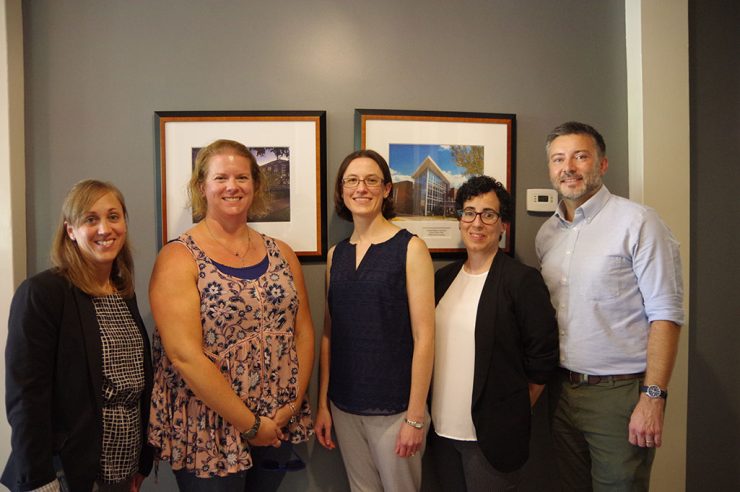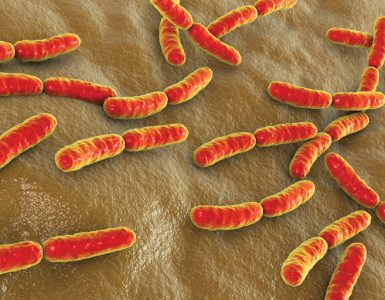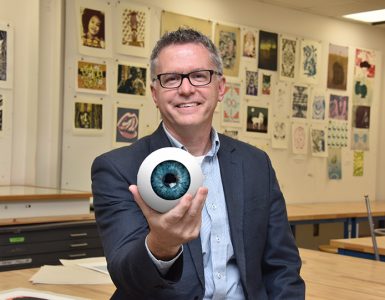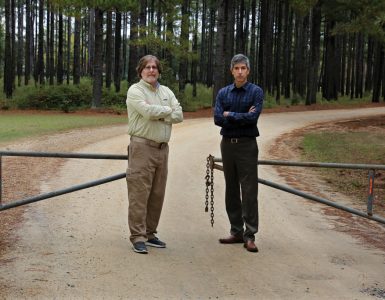Layman receives top reproductive medicine researcher award
Dr. Lawrence C. Layman, chief of the Section of Reproductive Endocrinology, Infertility and Genetics in the Department of Obstetrics and Gynecology at the Medical College of Georgia at Augusta University, is the 2019 recipient of the American Society for Reproductive Medicine’s Distinguished Researcher Award.
Layman, Robert B. Greenblatt, MD, Distinguished Chair in Endocrinology and co-director of the MD/PhD Program of MCG and the University System of Georgia, was selected for his basic and clinical research efforts to significantly advance the understanding of genes important in the process of reproductive development, sexual differentiation, puberty as well as the function of other organs. He was honored at the society’s recent Scientific Congress in Philadelphia.
Layman’s clinical expertise includes delayed puberty, infertility, recurrent pregnancy loss and menopause. A prolific physician-scientist, his current studies include the National Institutes of Health-funded genetic analysis of hundreds of patients with MRKH Syndrome, where the vagina and uterus do not develop. He is co-principal investigator on a National Heart, Lung and Blood Institute grant looking at the impact of estrogen on vascular health in diabetes.
He is the American Society for Reproductive Medicine’s liaison to the American College of Obstetrics and Gynecology’s Committee on Genetics and a member of the society’s Research Task Force and Research Steering Committee. He served as a society board member from Oct. 2017-Oct. 2018. He is a board member and past president of the Society for Reproductive Endocrinology and Infertility and a founding member of the American College of Medical Genetics. Layman was elected to membership in the international Association of American Physicians for leading senior physician scientists in the United States, Canada and elsewhere in early 2019.
He is the author or coauthor of 112 journal articles, and has been honored three times by MCG for his clinical science research.
Layman is a member of the Reproductive Endocrinology & Infertility Division of the American Board of Obstetrics and Gynecology. He is program director of the reproductive endocrinology and infertility fellowship at MCG and has mentored 86 medical students, residents and fellows.
He is a graduate of the University of Cincinnati School of Medicine, completed his obstetrics and gynecology residency at the University of Louisville in Kentucky and a research fellowship in reproductive endocrinology and genetics at MCG. He joined the MCG faculty for a short time following his fellowship, then moved to Tufts University where he helped found the Medical Genetics Department, then to the University of Chicago, where he was chief of the Section of Reproductive Endocrinology and Infertility, before returning to MCG in 1999 as section chief.
Molecular target essential for cancer but not normal cell proliferation
Identifying a protein that plays a key role in cancer cell growth is a first step toward the development of a targeted cancer therapy. It is especially promising when this protein is dispensable for the growth of normal cells. The discovery that UNC45A fits these criteria has researchers, led by Dr. Ahmed Chadli, of the Georgia Cancer Center at Augusta University, excited about potential new cancer therapeutic strategies involving the inhibition of UNC45A.
UNC45A has long been recognized as a molecular chaperone, responsible for helping other proteins reach their functional state by guiding protein folding. It has a distinct role in cancer, however, where its over-expression in breast and ovarian cancer patient tissues correlates with grade and stage of the disease. After confirming that UNC45A is not required for the proliferation of normal breast cells, Chadli’s group showed that in both cell and mouse models of breast cancer, UNC45A is required for cancer cell proliferation and tumor growth.
They published the underlying molecular mechanism in the Journal of Biological Chemistry, first by demonstrating that when they silenced UNC45A expression, an enzyme called NEK7 was also down-regulated, by twofold. NEK7 plays a key role in cell proliferation by orchestrating the proper separation of chromosomes during cell division. Either silencing UNC45A or deleting NEK7 resulted in decreased cancer cell proliferation, and adding NEK7 to UNC45A-silenced cells restored proliferative capacity.
Examining normal versus cancer cell lines and normal versus cancerous human breast tissues, the researchers observed significantly more UNC45A present inside (versus outside) of a cell’s nucleus. They further discovered that in the nucleus, UNC45A interacts with a protein called the glucocorticoid receptor that, in turn, promotes NEK7 expression.
Due to NEK7’s key role in cell division, they further explored the effect of silenced UNC45A on cell replication. Importantly, they found that silencing UNC45A, which results in NEK7 down-regulation, caused the cancer cells to undergo what is known as mitotic catastrophe and die, exemplifying the ultimate therapeutic goal.
This result was captured in a dramatic set of real-time videos of cell division in normal versus UNC45A-deficient cells. In normal cells (Movie 1), nuclear material, pictured in green, divides to form two separate cells, each surrounded by a cell membrane, which appears white. In UNC45A-deficient cells, (Movie 2), the nuclear material struggles to divide, and the division into two cells fails.
“Inhibiting UNC45A holds tremendous potential in the fight against solid tumors, since its role in proliferation does not seem to be necessary for the survival of normal cells,” Chadli said. “How to inhibit its tumoral role apart from its normal functions is the topic of future studies that would improve our understanding of this molecular machine and how to harness its potential clinical application.”
Cancer Center receives $6 million for minority/rural clinical trial access improvement
The Georgia Cancer Center at Augusta University has been awarded a six-year $6 million grant from the National Cancer Institute (NCI) to lead a statewide initiative that improves access to innovative clinical trials for a variety of cancers to underserved individuals across Georgia.
As one of 14 NCI Community Oncology Research Program (NCORP) Minority/Underserved Community Sites nationally, the Georgia Cancer Center’s Georgia CaRES (Georgia Cancer Research) network will use the money to recruit patients to conduct multi-site cancer clinical trials and cancer care delivery studies in the patients’ communities.
“We are very excited to get this award at a higher level of funding as it allows us to take cutting-edge cancer care across rural Georgia,” said Dr. Sharad Ghamande, associate director for clinical trials at the Georgia Cancer Center. “This will allow us to build on our success in our previous grant (2014-19), where 49% of our patients accrued to clinical trials were minorities.”
While discoveries start in a basic science lab, clinical trials are where the laboratory findings are translated to see how they can improve the treatment of cancer in patients. Clinical trials offer patients not only the standard of care chemotherapy but also the possibility of receiving treatment that could be more beneficial in the future. According to the NCI, the overall goal of NCORP is to bring cancer clinical research studies to individuals in their own communities, thereby generating a broadly applicable evidence base that contributes to improved patient outcomes and a reduction in cancer disparities. Cancer care delivery studies look at the success and cost-efficiency of current cancer care practices.
The 49% enrollment for patients in Georgia is a big increase over the national enrollment percentages. Research shows only 1 out of 20 cancer patients enroll in clinical trials. Of those patients, less than 5% are minorities. Because clinical trials are more commonly used to treat children with cancer, survival rates for childhood cancer have increased dramatically in the last few decades.
Ghamande, who serves as the principal investigator for the grant, will work with a team at the Georgia Cancer Center and partner sites across Georgia as well as one site in Mississippi. Partners include the University Cancer and Blood Center (Athens), Augusta Oncology Associates (Augusta), Morehouse School of Medicine (Atlanta), Phoebe Putney Memorial Hospital (Albany) and St. Dominic-Jackson Memorial Hospital (Jackson, Mississippi) which has a minority and rural population similar to what we see in Georgia.
“The awarding of this grant is a recognition of the efforts of Dr. Ghamande and the commitment of the Georgia Cancer Center to improve cancer care in our communities,” said Dr. Jorge Cortes, director of the Georgia Cancer Center. “There has been tremendous progress in our fight against cancer. Unfortunately, many patients do not have access to the most advanced therapies and clinical trials. By extending the participation in clinical trials of underserved and minority populations in Georgia and Mississippi through this grant, we can improve their long-term outlook.”
Six honored at Research Institute Awards
Six members, of Augusta University’s faculty were recognized at the 2019 Augusta University Research Institute Awards on Friday, Oct. 18.
Dr. Teal Benevides, associate professor in the Department of Occupational Health at the College of Allied Health Sciences, and Dr. Sangeetha Sukumari Ramesh, in the Department of Pharmacology and Toxicology at the Medical College of Georgia, both received the Emerging Scientist award.
“I was incredibly humbled to receive this award because there are so many incredible, highly qualified researchers at Augusta University,” Benevides said. “I am proud to have received it, but also think it’s important to recognize that research is a ‘team sport,’ and my receipt of this award is a reflection on the many people who have been involved in the process.”
The Emerging Scientist award honors AU faculty members in the early stages of their research careers who are beginning to make outstanding contributions to research. Benevides is recognized as a scholar in the field of occupational therapy and within the area of autism research.
“I am passionate about ensuring that individuals on the autism spectrum and those with other developmental conditions have access to necessary and desired services, and have opportunities to participate in meaningful life activities,” Benevides said.
“Many people think that those on the autism spectrum are children — but children grow up. So many individuals in our society are excluded or stigmatized for being on the autism spectrum, and my goals in research are to understand this community’s needs, identify opportunities to improve lives, and foster successful life outcomes for people, all throughout their lifespan,” she added.
Sukumari Ramesh is respected for her research characterizing secondary brain injury after intracerebral hemorrhage.
Also, Dr. Wendy Bollag, professor in the Department of Physiology at MCG, and Dr. Mark Hamrick, professor in the Department of Cellular Biology and Anatomy, both took home the Distinguished Researcher award.
This award recognizes a faculty member who has made significant sustained contributions to research, providing insights into mechanisms of disease prevention, detection or therapy.
Bollag is widely respected by her scientific peers for her work focused upon the mechanisms of hormones, growth factors, cytokines and other molecules’ signal cells.
“I was very flattered to receive the AURI Distinguished Researcher award, particularly since I was nominated by both a new colleague as well as a longtime collaborator and colleague whom I have known for more than 30 years,” Bollag said. “To be selected from among such stellar researchers and to share the award with Dr. Mark Hamrick, whom I respect tremendously as a researcher and colleague, represents a truly great honor from my AU colleagues.”
Hamrick is a musculoskeletal biologist whose research is focused on age-induced impairment of nutrient signaling related to bone loss.
“My initial interest was studying skeletal form and function in fossils to better understand the biology of extinct species,” he said. “Over time this led my research to focus more on the cellular and molecular mechanisms that influence the skeleton, which has now been directed toward understanding skeletal aging. As I move closer to becoming a fossil myself, studying bones is more relevant than ever!
“To me, the award acknowledges the many contributions of our collaborators, who have shared with us new approaches and techniques that helped to move our research forward,” he added.
Dr. R. William Caldwell, professor and chair emeritus of the department of Pharmacology and Toxicology at MCG, and Dr. Ruth Caldwell, professor of the department of Cellular Biology and Anatomy and the Vascular Biology Center, were honored with the Lifetime Achievement award for their sustained research productivity, teaching ability and commitment to service at the institutional, national and international level in the fields of pharmacology, vascular biology and medicine.
CSM celebrates year’s achievements
The College of Science and Mathematics received numerous grants throughout the past year, and Dean John Sutherland played host to a celebration of those accomplishments Sept. 6 at the Maxwell Alumni House.
Sutherland said the research and collaborations are an important part of Augusta University’s transition towards becoming a comprehensive research university.
“We had a very good year, bringing in five major external grants,” Sutherland said. “I think everybody enjoyed hearing about who was involved, the various collaborations between our faculty, and the engagement of our students in the research. The subject matter ranges from cancer biology of cells growing in culture to the ecology of marine and coastal environments and other diverse areas. It’s exciting that we have this broad range of research going on within the College of Science and Mathematics.”
The principal investigators, Drs. Jessica Reichmuth, Jennifer Bradford, Angie Spencer, Josefa Guerrero-Millan and Laurence Miller, all spoke briefly about their grants.
Reichmuth’s project, “Altered by a man-made cut: how an obsolete navigational channel affects estuarine dynamics,” is a collaboration between faculty at Augusta University and Georgia Southern. The project received a two-year Coastal Incentive Grant funded by the Georgia Department of Natural Resources Coastal Resources Division for over $80,000.
The goal is to measure all levels of the food web from phytoplankton to large fish, as well as water quality parameters, to investigate the effects of the Noyes Cut, an alteration of the Satilla River estuary by the Corps of Engineers in the 1930’s.
Bradford received a National Institute of Health R15 grant, which stipulates the involvement of undergraduate students in the research. Her project, “Delineating microglial NF-kappaB signaling in glioblastoma growth and therapy,” was awarded $443,996. The project is designed to advance knowledge about the relationship between microglia and glioblastoma, as well as how the nuclear factor-kappaB signaling pathway contributes to this disease.
Spencer received a National Science Foundation grant for $905,444. Her project, entitled “Promoting Opportunities and Pathways for Undergraduate Persistence in Science, Engineering, Technology, and Mathematics,” will fund scholarships over a period of three years for 30 or more students pursuing bachelor’s degrees in biological sciences, chemistry, mathematics or physics.
Guerrero-Millan was awarded a $70,000 grant from the American Chemical Society Petroleum Research Foundation for her project, “Effects of surface charge density in water-oil interfaces.” She said conventional oil recovery methods involve the formation of emulsions when water is injected to force the flow of crude oil to the head well. Her project will use microfluidic devices to mimic the pores of the rocks and improve our understanding of the processes that control how oil is extracted.
Like Bradford, Miller received a comparably funded NIH R15 grant. The goal of his project, “Age-related functional consequences and treatment of pain,” is to improve treatment of pain-related behavioral dysfunction in older adults by obtaining new knowledge on the role of aging in the expression and treatment of clinically-relevant, pain-related depression of behavior.
Miller said the student-centric grant will provide research opportunities with mice. He hopes this project will help him develop new ways of studying pain at the preclinical level.
“There’s a transformation going on in pain research these days. People are understanding that the old methods, while they were valuable, are missing some key angles to studying pain,” Miller said. “I want to establish a battery of preclinical models for studying the functional consequences of pain. I’m also looking to use those models to examine variables that influence the effects of opioid analgesics. We know that they’re long established as effective pain relievers, but clearly there are issues related to abuse potential. So we’re interested in examining those variables as well as using procedures to assess other classes of drugs that maybe haven’t traditionally been considered for pain relief, but may have some promise if we consider the appropriate targets.”
All five expressed gratitude for the amount of collaboration that went into their projects, as Sutherland noted.
“Collaborations are good; they promote healthy and productive research,” said Sutherland, who said there was plenty of teamwork from within departments in the college, the faculty and students, and other institutions within the University System of Georgia.
Dr. Gretchen Caughman, executive vice president for academic affairs and provost, said that celebration is key for “all the wonderful things we’re doing here in the College of Science and Mathematics.”
“It takes so many hours, and so many people to even apply for a grant. And then, when it comes to fruition and the grant is awarded, it’s just a wonderful celebration,” she said.
Caughman was excited to hear about all of the collaboration across not only the departments but between the Summerville and Health Sciences campuses. She noted that the funding of these grants represents an enormous step forward in terms of the goals that were laid in place at the time of the university’s consolidation.
“We had a lot of great things before in our legacy institutions, but now they’re really starting to crystallize into something that’s so much more,” she said. “The other key factor for me was that a number of those grants are built out of research projects in which undergraduate students have been involved. The support that this faculty provides for our undergraduates is producing impressive results, not just for the students but for the faculty themselves.”
Caughman said it was important to have these multiyear projects in place in anticipation of the college’s move to the new College of Science and Mathematics building, knowing that it will provide a great working environment for the faculty and students.
“At the end of the day, it’s about the people, the researchers and their interactions with one another. It’s going to be great to see it continue and grow into so much more,” she said.










